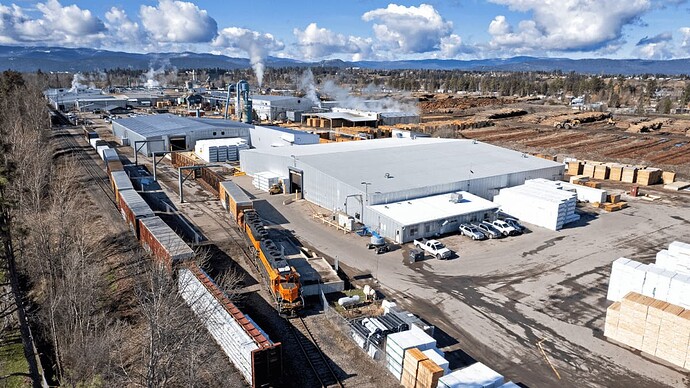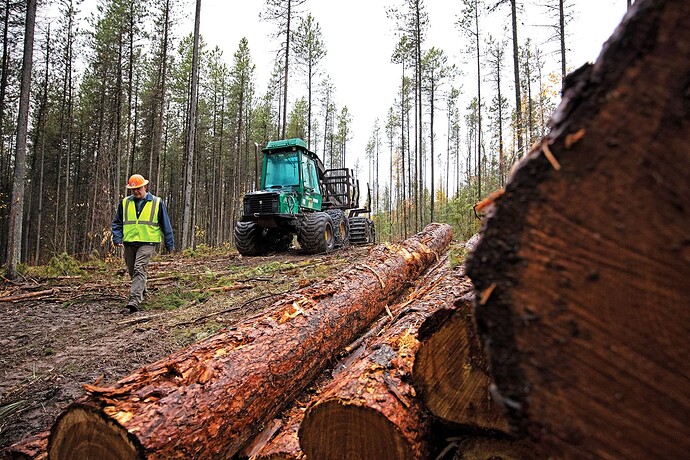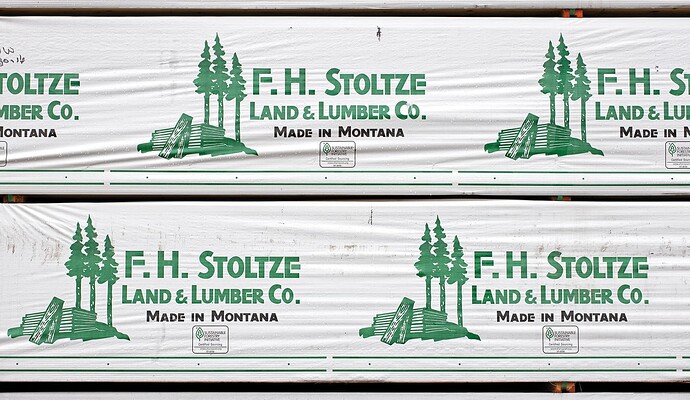More than 30 mills have closed in western Montana since 1990, with two more in Missoula County calling it quits this spring.
Five days a week, a short train rolls out of the rail yard in Whitefish with empty freight cars destined for the Flathead Valley’s three surviving wood products mills in Columbia Falls and Evergreen. At one time, short trains like this could be found all over western Montana, serving mills in places like Libby, St. Regis, Darby and Pablo. But today, this is one of the few “local” freights left in the region.
Since 1990, about three dozen mills have closed in western Montana, a list that will soon include Pyramid Mountain Lumber in Seeley Lake and Roseburg Forest Products in Missoula, both of which announced plans to shutter within a week of each other last month.
“It was a shock,” said Julia Altemus, executive director of the Montana Wood Products Association, who has tracked mill closures over the decades.
In a press release on March 14, Pyramid’s owners stated that the family-owned mill had faced tough times before, specifically in the early 2000s when mills across the Pacific Northwest were closing. Perennial issues like an inconsistent timber supply and constantly fluctuating lumber prices contributed to those challenges. But this time, new issues — including a housing shortage impacting many communities in western Montana — led to Pyramid’s decision to call it quits.
“Today’s crisis is much worse than what was experienced in 2000, 2007, and 2015,” Pyramid officials wrote. “There is simply no better solution for the owners than to shut the mill down permanently.”
Five days later, Roseburg’s announcement cited many of the same reasons for closing. The back-to-back closures leave western Montana with just a half dozen major mills: Sun Mountain Lumber in Deer Lodge and Livingston; Thompson River Lumber in Thompson Falls; Stoltze Land & Lumber Co. in Columbia Falls; and Weyerhaeuser’s medium-density fiberboard and plywood mills in Columbia Falls and Evergreen.
Altemus said the timber industry is a tough one and lumber prices fluctuate constantly. But she believes mills like Pyramid in Seeley Lake could have survived had they been able to secure a consistent supply of timber — especially when prices for lumber jumped a few years ago. Altemus put much of the blame for that on the U.S. Forest Service and lawsuits over concerns about wildlife habitat, water quality and other environmental issues that often tie up lumber sales in court.
Paul McKenzie, vice president and general manager of F.H. Stoltze Land & Lumber Co. in Columbia Falls, echoed that frustration. In 2023, the company got about 70% of its wood from national forest land — the most it had gotten from that source in years — but that amount was going to be significantly less this year. That’s a problem for the industry, McKenzie said, when the federal government is the largest landowner in the region. While Stoltze can cut timber on state land, its own land and other privately held tracts of forest, it’s hard to make up what could come from the government-owned land.
But that isn’t the only challenge Stoltze is facing, McKenzie said, adding that the pressures that put Pyramid out of business and forced Roseburg to shut down are also impacting his company. Years ago, mills provided some of the best-paying jobs in places like the Flathead Valley, but with the cost of housing skyrocketing there, those wages just don’t go as far as they once did, making it hard to attract workers. Lumber prices are also down significantly. A few years ago, the mill could get about $800 for every 1,000 board feet produced; now it’s about $500 for every 1,000 board feet, McKenzie said.
“We’re losing money on every stick of lumber that goes out the door,” McKenzie said. “That’s just a fact of this market.”
However, McKenzie said he hasn’t lost hope about the timber industry. While prices are down now, there’s no doubt that there is a demand for lumber and other wood products, especially as the nation tries to close its housing supply gap (by some estimates, the U.S. needs about 7.2 million more homes).
Stoltze is also looking for ways to expand its business. A few years ago, the company established a new branch called Stoltze Timber Systems, which produces pre-fabricated structures using cross-laminated timber. Such construction is appealing to a lumber mill like Stoltze because it allows it to use smaller trees that in the past had little use.
“The long-term outlook for the wood products industry is strong. It’s just a matter of surviving the tight times so we’re here when people need us,” McKenzie said. “We want to be here 100 years from now.”
Sherm Anderson, owner of Sun Mountain Lumber in Deer Lodge, is also looking to the future. Like McKenzie, he said timber supply issues are the biggest challenge for his business, but he’s confident his grandson will someday be able to take over the company.
“I’m confident that there’s a future in this for him and for generations to come,” he said. “The outlook for the wood products industry right now isn’t great, but I still think it has a future.”
Anderson is so confident, in fact, that Sun Mountain expanded in 2023 when it purchased R-Y Timber in Livingston. That mill had closed after a fire in February 2023.
Altemus, the executive director of the Montana Wood Products Association, said she was still hopeful that a similar situation could develop in Seeley Lake and that someone would purchase and reopen the Pyramid mill. She said anytime a mill closes it has ripple effects throughout the entire industry, from loggers to truckers. Right now, western Montana still has the infrastructure to support the industry, but that might not be the case if more mills close, she said.
Regardless of what happens in the coming months, McKenzie said it’s hard to see not one but two mills call it quits so quickly.
“It’s heartbreaking,” McKenzie said. “These people are our friends and colleagues, and I know they must have agonized over these decisions.”
Source: Mill closures shock industry but officials say demand for wood remains


